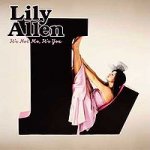
Lily Allen It’s Not Me, It’s You
(Parlophone)
A lot of people are going to love this album – and I get why. On the one hand, Lily Allen is fresh, sassy, playful, and provocative in ways so many pop divas could never hope to be. But I’m torn. When I first heard Smile, I loved it. Allen is funny, smart, and doesn’t seem to take herself too seriously. She has a similar appeal as Liz Phair had when she first appeared: the shock value of a cute 20-something female who isn’t afraid to cuss and talk frankly about sex and drugs – except Allen’s schtick is totally tongue in cheek. Half the time, though, it seems that’s all she has going for her, and after repeated listens, it simply gets old.
Case in point: What’s the most immediately accessible, funny, catchy song off It’s Not Me, It’s You? Fuck You – a track that epitomizes Allen’s comic ability as she chucks lines like “Fuck you very, very, much” and “Do you get a little kick out of being small-minded?” And yet she still comes across as cuddly as a stuffed animal. But to be honest, it took me about three listens before I started to get annoyed. A friggin’ high school student could have written that song. Take lyrics from Not Fair – “It’s not fair and I think you’re really mean”? The coy sensibilities offer a childish take on love, and at first listen that’s enough for me. But after the second, third, fourth listen, the gig is tired.
So does she need to go deeper in her lyrical stylings? Fat chance. Opener Everyone’s At It finds Allen attempting to make a socio-political statement about the pervasiveness of drug abuse. But when she sings “how can we start to tackle the problem if you don’t put your hands up and admit that you’re on them?” it sounds trite – a sad attempt to be more influential than she is. When I first heard it, I actually thought it was just a joke – Allen poking fun at pop stars who try to change the world with inspirational lyrics. But with further listens, I think she’s actually serious – and it’s just poor taste.
There’s also an issue with the music. It’s catchy, it’s energetic, and it makes you move – all plusses in my book. That said, I don’t know if I’ve ever heard a record that sounds so much like everything else. 22 bears far too much resemblance to a Katy Perry b-side – bright, doubled vocals laid over bass-heavy club beats and electro leads and fills. I Could Say, built out piano chords and earnest, heartfelt vocals (from you Lily Allen?), sounds like Natasha Bedingfield filtered through the Killers. At first listen, Who’d Have Known seems the most humble and honest song Allen has ever written, until you realize it’s because the melody is stolen from Elliott Smith’s Say Yes – maybe not a chart topper, but Allen’s hardly being novel.
Thing is, no matter how wry her wit may be (and let’s be honest, sometimes it’s lacking), no matter well her lyrics refuse convention (and they often fail to), the music is ultimately more derivative than reactionary. While Allen’s words respond to the clichés of Billboard’s Hot 100, the sounds more or less subscribe to the same hit-making formulas we hear every day. That isn’t to say the record is bad, but after you’ve heard the jokes one too many times, what’s left? Very little that’s unique or original.
Allen needs to stick to her schtick. It doesn’t get any better than when she flicks out witty lines like “I’ll take my clothes off, and it won’t be shameless, ’cause everyone knows that’s how you get famous” (one especially poignant considering Allen’s own paparazzi-filmed escapades). But she has to find the happy medium – sadly, she doesn’t always hit it. The record has it’s moments. But do we really see a future from a pop starlet who seems to fall into all the pitfalls of the pop stars she got famous for making fun of? It’s difficult to argue.
20 February, 2009 - 14:54 — Conor McKay